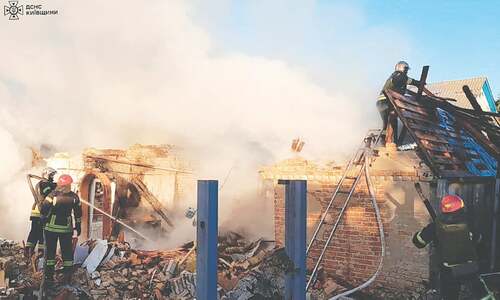YEREVAN: Armenian separatists in Azerbaijan’s breakaway enclave of Nagorno-Karabakh on Sunday agreed on delivery of humanitarian supplies through the territory controlled by Baku, marking the first step towards de-escalation in the volatile region.
Armenia has accused Azerbaijan of fuelling a humanitarian crisis in Nagorno-Karabakh after Baku blocked last year the sole road linking the mountainous region with Armenia, the Lachin corridor policed by Russian peacekeepers.
Azerbaijan has rejected the accusation, arguing Nagorno-Karabakh could receive all the supplies it needed via Azerbaijan.
Baku has said that the separatist authorities had simply refused its proposal to simultaneously reopen both the Lachin corridor and the Aghdam road which connects Nagorno-Karabakh with the rest of Azerbaijan.
On Sunday, the separatist government said it has agreed to allow “simultaneous deliveries of humanitarian cargo” via both routes.
It said that unspecified “mediators are working to organise a meeting with the official representatives of Artsakh (Armenian name of Nagorno-Karabakh) and Azerbaijan in order to alleviate the tense humanitarian and security situation in the republic.”—AFP
The foreign ministry in Baku said it was notified by the International Committee of the Red Cross that the separatist authorities “have agreed on parallel supplies of humanitarian cargo as of Sept 18 (Monday).” The European Union and United States have called for the reopening of Lachin and Aghdam routes for humanitarian aid as Nagorno-Karabakh experienced shortages of food and medicine.
The months-long crisis as well as Baku’s deployment of troops near Nagorno-Karabakh and along the border with Armenia have sparked fears of a fresh all-out conflict between the arch-foes who have fought two wars for control of the region.
Six weeks of fighting ended in autumn 2020 with a Russian-brokered truce that saw Armenia cede swathes of territory it had controlled since the 1990s.
The two sides have been unable to reach a lasting peace settlement despite mediation efforts by the European Union, United States and Russia.
Published in Dawn, September 18th, 2023
















































Dear visitor, the comments section is undergoing an overhaul and will return soon.